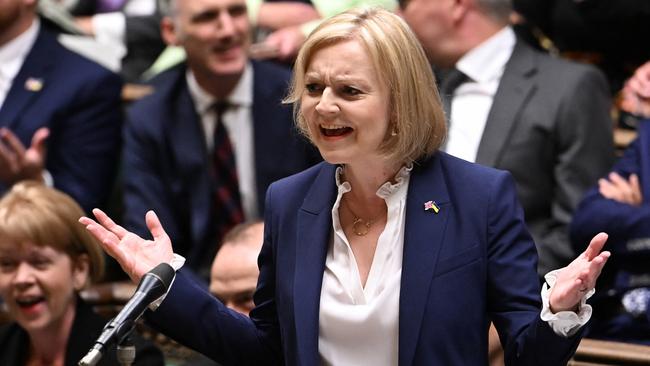UK PM announces energy bailout funded by borrowing
Liz Truss has unveiled a £100bn ($172.5bn) bailout package to help households and companies survive a surge in energy prices.

Britain’s new Prime Minister, Liz Truss, has unveiled a £100bn ($172.5bn) bailout package to help households and companies survive a surge in energy prices triggered by the war in Ukraine, but she ruled out any new windfall taxes on energy companies.
During her first appearance as Prime Minister in the House of Commons on Wednesday, Ms Truss promised that her government would help households and businesses struggling with high inflation and skyrocketing energy costs by capping their bills and cutting taxes, which she said would stimulate a sluggish economy.
“The reality is this country will not be able to tax its way to growth,” she said.
Ms Truss, who took over from Boris Johnson this week, on Thursday announced a vast package to limit the amount energy companies can charge businesses and households.
The bailout, which officials estimate could cost 100bn, is aimed at preventing a sharp recession in the northern autumn, with some fearing energy bills could rise 80 per cent without government intervention.
Details of the package were presented on Thursday night to the Commons. In October, an existing UK price cap on energy will be recalibrated to reflect far higher market prices for natural gas.
Absent government support, the average household bill would rise to about £3500 a year for energy, compared with a current annual average of £1900, according to a British regulator in charge of setting the cap.
Under the new package, household energy bills will be capped at £2500 annually for two years from October 1.
Ms Truss is trying to move fast to shore up an economy headed into the doldrums. Inflation is at a 40-year high and wages are falling at their fastest pace in 20 years. A recession is predicted in the coming months. She is rushing to push through supply-side reforms, including cutting payroll taxes and scrapping a planned increase in corporation tax.
Battle lines were quickly drawn on Wednesday with the Labour Party over how the British state would fund such a package, which comes after substantial government spending during the Covid-19 pandemic.
Opposition Leader Keir Starmer criticised Ms Truss, the former foreign secretary, for not placing a windfall tax on energy companies that he said stood to make £170bn in excess profits during the coming years, arguing that taxpayers would ultimately be left to foot the bills. “Is she really telling us she’s going to leave these vast profits on the table and let working people foot the bill?” Sir Keir said.
Labour has advocated a freeze on energy bills funded in part by a windfall tax on energy companies’ profits.
Under Mr Johnson, a government subsidy announced earlier this year to help poorer households with their bills was paid for by such a tax. Ms Truss ruled out increasing that levy, arguing that doing so would “put off companies from investing in the UK”. Instead, she said a growing economy would ensure the package was paid for.
She added that Sir Keir “doesn’t understand aspiration, doesn’t understand opportunity and doesn’t understand that people want to keep more of their money”. Part of the solution, she said, was to produce more energy in the UK, in particular by getting more oil and gas from the North Sea and building more nuclear plants.
Yields on UK government debt are up to their highest levels since 2014 as investors become more nervous about the state of the nation’s finances. New Chancellor of the Exchequer Kwasi Kwarteng met with business leaders to reassure them of the government’s plans. The Chancellor “was clear this will mean necessary higher borrowing in the short term whilst ensuring monetary stability and fiscal discipline over the medium term”, the Treasury said. “He committed to ensuring the economy grows faster than our debts.”
Economists said a bailout would cushion a likely recession and help slow growing inflation. During a meeting with politicians, Bank of England governor Andrew Bailey on Tuesday welcomed a forthcoming energy package, but said a recession was still “the most likely outcome”, and warned that inflation was becoming increasingly embedded in the economy as businesses raise their prices in anticipation of higher costs.
Analysts think that the Bank of England will have to continue to raise rates to tamp down inflation that the central bank projects will hit 13 per cent by year-end.
The Wall Street Journal



To join the conversation, please log in. Don't have an account? Register
Join the conversation, you are commenting as Logout